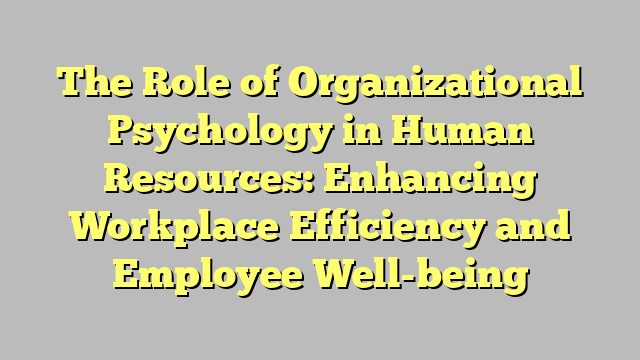The Role of Organizational Psychology in Human Resources: Enhancing Workplace Efficiency and Employee Well-being
The Role of Organizational Psychology in Human Resources: Enhancing Workplace Efficiency and Employee Well-being
Organizational psychology plays a crucial role in human resources by focusing on enhancing workplace efficiency and promoting employee well-being. By understanding the psychological dynamics within an organization, HR professionals can create a positive work environment that fosters productivity and supports the mental and emotional health of employees.
Key Areas of Focus in Organizational Psychology
- Employee motivation and engagement
- Leadership development and team dynamics
- Workplace culture and organizational climate
- Conflict resolution and stress management
- Employee satisfaction and well-being
These areas are essential for HR professionals to consider when designing and implementing strategies to improve workplace efficiency and support employee well-being.
Using Organizational Psychology to Enhance Workplace Efficiency
Organizational psychology provides valuable insights into the factors that influence workplace efficiency. By understanding the psychological drivers of employee motivation and engagement, HR professionals can design incentive programs, recognition initiatives, and performance management systems that effectively boost productivity and job satisfaction.
Additionally, organizational psychology helps HR professionals identify and address barriers to efficiency, such as communication breakdowns, role ambiguity, and conflicting priorities. By applying psychological principles to these challenges, HR professionals can develop strategies to streamline processes, clarify expectations, and improve teamwork.
Supporting Employee Well-being through Organizational Psychology
Employee well-being is a critical concern for HR professionals, and organizational psychology offers valuable tools for promoting mental and emotional health in the workplace. By understanding the psychological impact of work-related stress, job dissatisfaction, and burnout, HR professionals can develop programs and policies that support employee well-being.
Organizational psychology also provides insights into the factors that contribute to a positive workplace culture and supportive organizational climate. By fostering a culture of respect, trust, and open communication, HR professionals can create an environment that promotes employee well-being and reduces the risk of psychological distress.
Implementing Organizational Psychology Strategies in HR
HR professionals can leverage organizational psychology in several ways to enhance workplace efficiency and support employee well-being. This may include:
- Conducting psychological assessments to understand employee motivations and work preferences
- Implementing leadership development programs based on psychological principles
- Using psychological techniques to improve communication and conflict resolution
- Designing employee wellness programs that address mental and emotional health
- Creating a positive organizational culture through psychological interventions
By integrating these strategies into HR practices, organizations can create a work environment that maximizes efficiency and promotes the well-being of their employees.
The Impact of Organizational Psychology on HR Practices
Organizational psychology has a significant impact on HR practices, as it provides a scientific foundation for understanding human behavior in the workplace. By applying psychological principles to HR strategies, organizations can improve their recruitment and selection processes, enhance employee engagement and retention, and create a positive work environment that supports the well-being of their employees.
Ultimately, the role of organizational psychology in human resources is to create a workplace that maximizes efficiency and productivity while also prioritizing the mental and emotional health of employees. By leveraging the insights and tools provided by organizational psychology, HR professionals can play a key role in achieving these dual objectives.

